Detailed Report: Travel and Tourism Sector in the UK - Analysis
VerifiedAdded on 2020/01/21
|13
|5059
|117
Report
AI Summary
This report provides a comprehensive analysis of the travel and tourism sector, beginning with its historical developments and the evolution of tourism in the UK, highlighting the shift from upper-class dominance to mass tourism facilitated by the industrial revolution and technological advancements. It then examines the sector's structure, encompassing various industries like hospitality, transportation, and tour operators, and emphasizes the importance of coordination among these elements and supportive services. The report further explores the roles of government bodies, local authorities, and international agencies in regulating and promoting tourism, including the influence of economic policies and political changes on the sector's success. It discusses factors affecting tourism demand, the supply-side adjustments, and the positive and negative impacts of tourism, offering strategies to mitigate negative consequences. The report concludes with a summary of the key findings and insights into the dynamic nature of the travel and tourism sector.

Travel and Tourism Sector
1
1
Paraphrase This Document
Need a fresh take? Get an instant paraphrase of this document with our AI Paraphraser
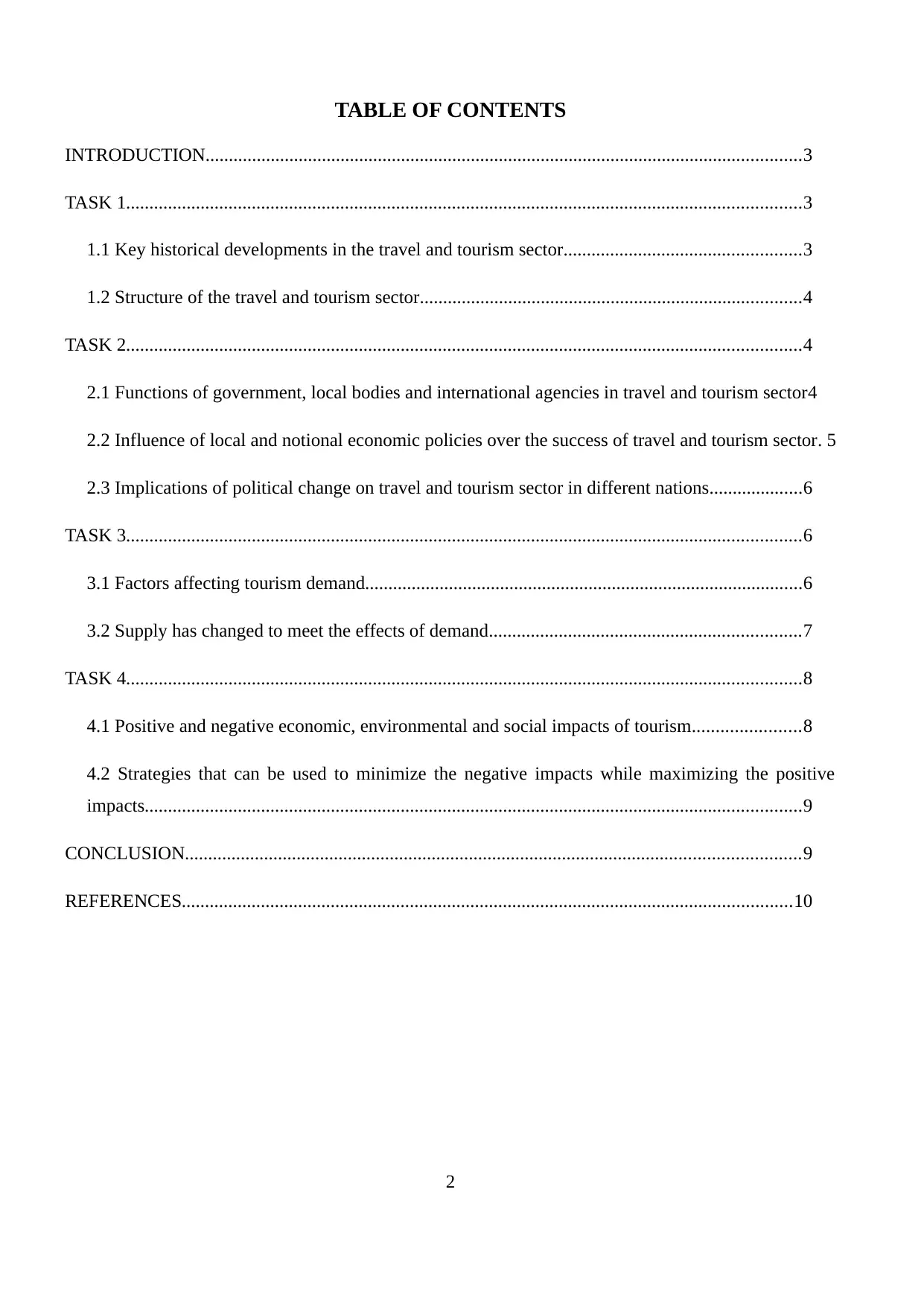
TABLE OF CONTENTS
INTRODUCTION................................................................................................................................3
TASK 1.................................................................................................................................................3
1.1 Key historical developments in the travel and tourism sector...................................................3
1.2 Structure of the travel and tourism sector..................................................................................4
TASK 2.................................................................................................................................................4
2.1 Functions of government, local bodies and international agencies in travel and tourism sector4
2.2 Influence of local and notional economic policies over the success of travel and tourism sector. 5
2.3 Implications of political change on travel and tourism sector in different nations....................6
TASK 3.................................................................................................................................................6
3.1 Factors affecting tourism demand..............................................................................................6
3.2 Supply has changed to meet the effects of demand...................................................................7
TASK 4.................................................................................................................................................8
4.1 Positive and negative economic, environmental and social impacts of tourism.......................8
4.2 Strategies that can be used to minimize the negative impacts while maximizing the positive
impacts.............................................................................................................................................9
CONCLUSION....................................................................................................................................9
REFERENCES...................................................................................................................................10
2
INTRODUCTION................................................................................................................................3
TASK 1.................................................................................................................................................3
1.1 Key historical developments in the travel and tourism sector...................................................3
1.2 Structure of the travel and tourism sector..................................................................................4
TASK 2.................................................................................................................................................4
2.1 Functions of government, local bodies and international agencies in travel and tourism sector4
2.2 Influence of local and notional economic policies over the success of travel and tourism sector. 5
2.3 Implications of political change on travel and tourism sector in different nations....................6
TASK 3.................................................................................................................................................6
3.1 Factors affecting tourism demand..............................................................................................6
3.2 Supply has changed to meet the effects of demand...................................................................7
TASK 4.................................................................................................................................................8
4.1 Positive and negative economic, environmental and social impacts of tourism.......................8
4.2 Strategies that can be used to minimize the negative impacts while maximizing the positive
impacts.............................................................................................................................................9
CONCLUSION....................................................................................................................................9
REFERENCES...................................................................................................................................10
2
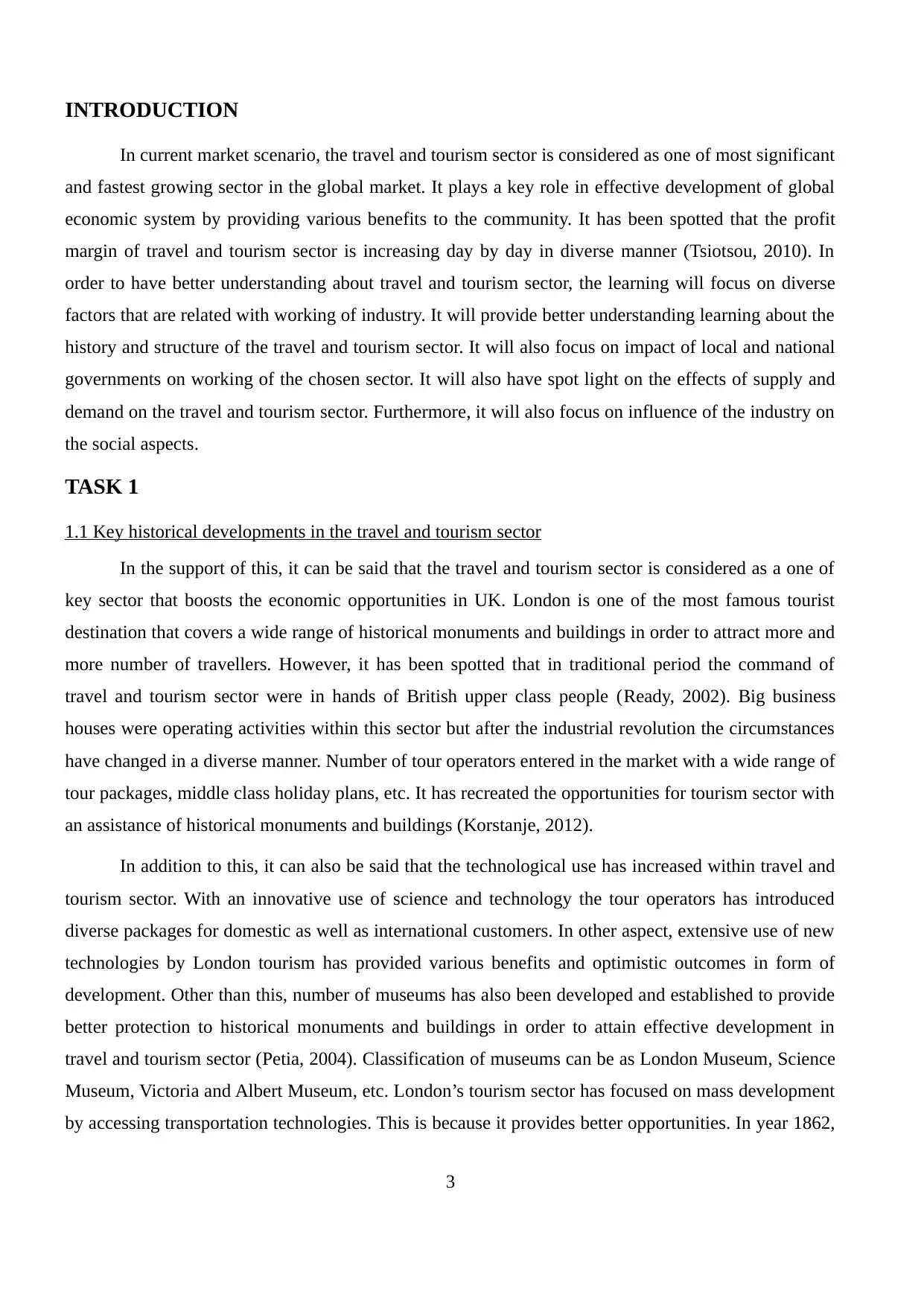
INTRODUCTION
In current market scenario, the travel and tourism sector is considered as one of most significant
and fastest growing sector in the global market. It plays a key role in effective development of global
economic system by providing various benefits to the community. It has been spotted that the profit
margin of travel and tourism sector is increasing day by day in diverse manner (Tsiotsou, 2010). In
order to have better understanding about travel and tourism sector, the learning will focus on diverse
factors that are related with working of industry. It will provide better understanding learning about the
history and structure of the travel and tourism sector. It will also focus on impact of local and national
governments on working of the chosen sector. It will also have spot light on the effects of supply and
demand on the travel and tourism sector. Furthermore, it will also focus on influence of the industry on
the social aspects.
TASK 1
1.1 Key historical developments in the travel and tourism sector
In the support of this, it can be said that the travel and tourism sector is considered as a one of
key sector that boosts the economic opportunities in UK. London is one of the most famous tourist
destination that covers a wide range of historical monuments and buildings in order to attract more and
more number of travellers. However, it has been spotted that in traditional period the command of
travel and tourism sector were in hands of British upper class people (Ready, 2002). Big business
houses were operating activities within this sector but after the industrial revolution the circumstances
have changed in a diverse manner. Number of tour operators entered in the market with a wide range of
tour packages, middle class holiday plans, etc. It has recreated the opportunities for tourism sector with
an assistance of historical monuments and buildings (Korstanje, 2012).
In addition to this, it can also be said that the technological use has increased within travel and
tourism sector. With an innovative use of science and technology the tour operators has introduced
diverse packages for domestic as well as international customers. In other aspect, extensive use of new
technologies by London tourism has provided various benefits and optimistic outcomes in form of
development. Other than this, number of museums has also been developed and established to provide
better protection to historical monuments and buildings in order to attain effective development in
travel and tourism sector (Petia, 2004). Classification of museums can be as London Museum, Science
Museum, Victoria and Albert Museum, etc. London’s tourism sector has focused on mass development
by accessing transportation technologies. This is because it provides better opportunities. In year 1862,
3
In current market scenario, the travel and tourism sector is considered as one of most significant
and fastest growing sector in the global market. It plays a key role in effective development of global
economic system by providing various benefits to the community. It has been spotted that the profit
margin of travel and tourism sector is increasing day by day in diverse manner (Tsiotsou, 2010). In
order to have better understanding about travel and tourism sector, the learning will focus on diverse
factors that are related with working of industry. It will provide better understanding learning about the
history and structure of the travel and tourism sector. It will also focus on impact of local and national
governments on working of the chosen sector. It will also have spot light on the effects of supply and
demand on the travel and tourism sector. Furthermore, it will also focus on influence of the industry on
the social aspects.
TASK 1
1.1 Key historical developments in the travel and tourism sector
In the support of this, it can be said that the travel and tourism sector is considered as a one of
key sector that boosts the economic opportunities in UK. London is one of the most famous tourist
destination that covers a wide range of historical monuments and buildings in order to attract more and
more number of travellers. However, it has been spotted that in traditional period the command of
travel and tourism sector were in hands of British upper class people (Ready, 2002). Big business
houses were operating activities within this sector but after the industrial revolution the circumstances
have changed in a diverse manner. Number of tour operators entered in the market with a wide range of
tour packages, middle class holiday plans, etc. It has recreated the opportunities for tourism sector with
an assistance of historical monuments and buildings (Korstanje, 2012).
In addition to this, it can also be said that the technological use has increased within travel and
tourism sector. With an innovative use of science and technology the tour operators has introduced
diverse packages for domestic as well as international customers. In other aspect, extensive use of new
technologies by London tourism has provided various benefits and optimistic outcomes in form of
development. Other than this, number of museums has also been developed and established to provide
better protection to historical monuments and buildings in order to attain effective development in
travel and tourism sector (Petia, 2004). Classification of museums can be as London Museum, Science
Museum, Victoria and Albert Museum, etc. London’s tourism sector has focused on mass development
by accessing transportation technologies. This is because it provides better opportunities. In year 1862,
3
⊘ This is a preview!⊘
Do you want full access?
Subscribe today to unlock all pages.

Trusted by 1+ million students worldwide

the Thomas Cook introduced their first tour package for three global destinations such as Far East,
India and America (Normann, 2013).
1.2 Structure of the travel and tourism sector
As per the structured study, it can be said that the travel and tourism sector is a combination of
diverse industries which covers the wide range of services. Classification of services can be done as
hospitality, restaurant, transportation, etc. It clearly indicates that the sector structure is consisted of
varied elements.
In addition to this, the tour agents plays a key role in effective implementation of diverse leisure
activities. It is necessary for tour operators to design best plan in low cost so that customers can have
easy access to services as per their needs. It is essential for tour operators to have effective
coordination with different factors of hospitality in order to meet standards of accommodation,
transportation, finance etc. (Beaver, 2005). It is also necessary to consider varied supportive services as
it may influence the overall working of sector. Proper coordination with money exchange authorities,
guide association and advertising companies is also critical in order to meet the objective of
international tourism plans.
Other than this, the accommodation is one of most significant factor of travel and tourism
sector. However, tour operators arranges the specific accommodation service as per the needs of the
guests. Classification of accommodation services can be done on the basis of villa, hotel, resort, etc.
Moreover, the transportation is another factor that helps business firm to provide better connectivity to
tourist destination in order to attain sustainable development of leisure industry (Jackson, 2008). There
are number of modes that this sector uses as per the demand of customer's such as air, rail, and ship.
Transportation factor can also influence the cost of tour packages so it is essential for organisations to
consider it as a crucial aspect.
At last, the wide range of tourist destination availability is also a critical for sector. This is
because it is lifeline of travel and tourism sector. Number of natural and man-made destinations
influences the perception of customer's so it is necessary for sector to have collaborative and
continuous development of attractions (Ruhanen, 2012). It will attract more and more customer's to
destination and provide better opportunity to the travel and tourism sector.
4
India and America (Normann, 2013).
1.2 Structure of the travel and tourism sector
As per the structured study, it can be said that the travel and tourism sector is a combination of
diverse industries which covers the wide range of services. Classification of services can be done as
hospitality, restaurant, transportation, etc. It clearly indicates that the sector structure is consisted of
varied elements.
In addition to this, the tour agents plays a key role in effective implementation of diverse leisure
activities. It is necessary for tour operators to design best plan in low cost so that customers can have
easy access to services as per their needs. It is essential for tour operators to have effective
coordination with different factors of hospitality in order to meet standards of accommodation,
transportation, finance etc. (Beaver, 2005). It is also necessary to consider varied supportive services as
it may influence the overall working of sector. Proper coordination with money exchange authorities,
guide association and advertising companies is also critical in order to meet the objective of
international tourism plans.
Other than this, the accommodation is one of most significant factor of travel and tourism
sector. However, tour operators arranges the specific accommodation service as per the needs of the
guests. Classification of accommodation services can be done on the basis of villa, hotel, resort, etc.
Moreover, the transportation is another factor that helps business firm to provide better connectivity to
tourist destination in order to attain sustainable development of leisure industry (Jackson, 2008). There
are number of modes that this sector uses as per the demand of customer's such as air, rail, and ship.
Transportation factor can also influence the cost of tour packages so it is essential for organisations to
consider it as a crucial aspect.
At last, the wide range of tourist destination availability is also a critical for sector. This is
because it is lifeline of travel and tourism sector. Number of natural and man-made destinations
influences the perception of customer's so it is necessary for sector to have collaborative and
continuous development of attractions (Ruhanen, 2012). It will attract more and more customer's to
destination and provide better opportunity to the travel and tourism sector.
4
Paraphrase This Document
Need a fresh take? Get an instant paraphrase of this document with our AI Paraphraser
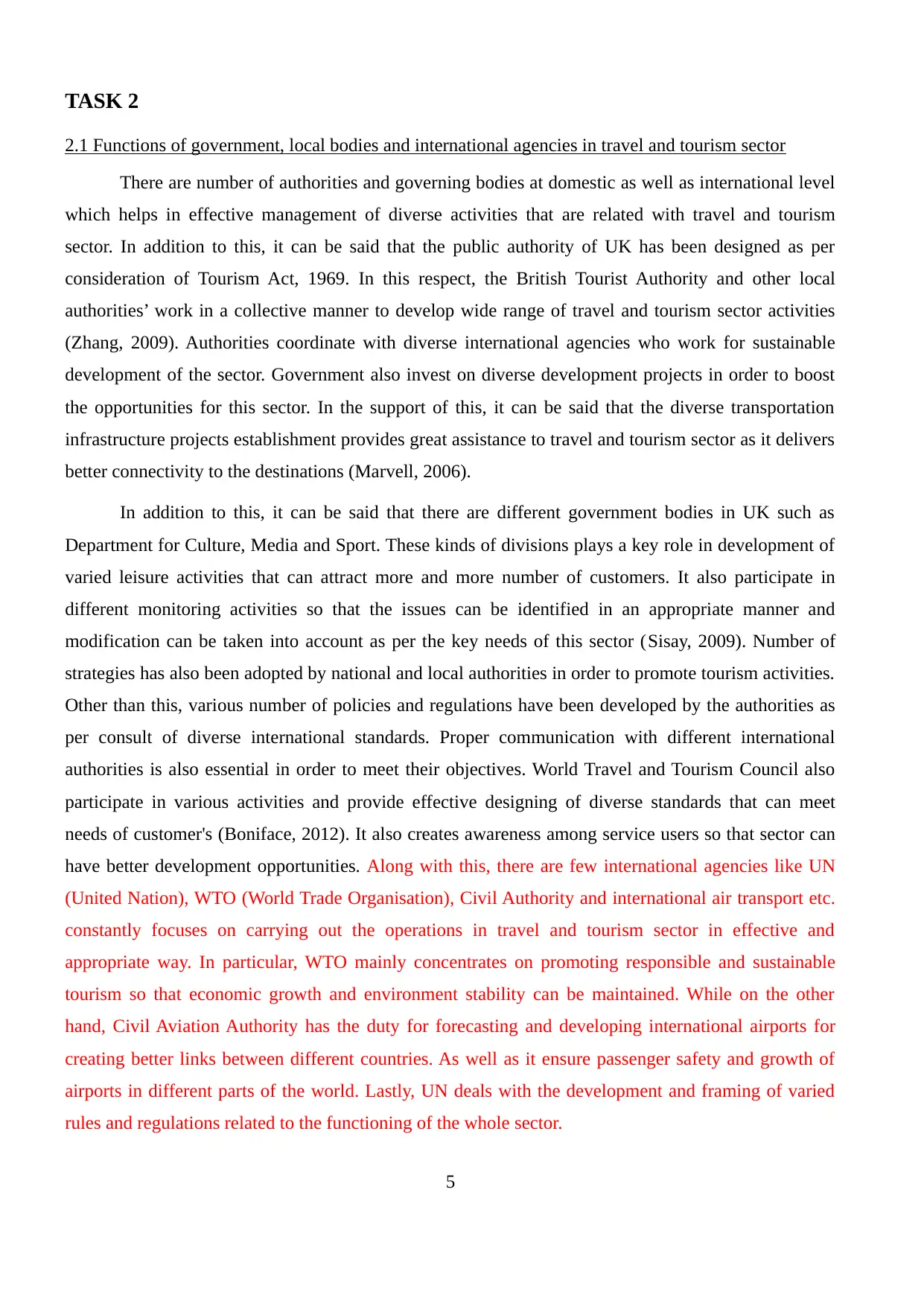
TASK 2
2.1 Functions of government, local bodies and international agencies in travel and tourism sector
There are number of authorities and governing bodies at domestic as well as international level
which helps in effective management of diverse activities that are related with travel and tourism
sector. In addition to this, it can be said that the public authority of UK has been designed as per
consideration of Tourism Act, 1969. In this respect, the British Tourist Authority and other local
authorities’ work in a collective manner to develop wide range of travel and tourism sector activities
(Zhang, 2009). Authorities coordinate with diverse international agencies who work for sustainable
development of the sector. Government also invest on diverse development projects in order to boost
the opportunities for this sector. In the support of this, it can be said that the diverse transportation
infrastructure projects establishment provides great assistance to travel and tourism sector as it delivers
better connectivity to the destinations (Marvell, 2006).
In addition to this, it can be said that there are different government bodies in UK such as
Department for Culture, Media and Sport. These kinds of divisions plays a key role in development of
varied leisure activities that can attract more and more number of customers. It also participate in
different monitoring activities so that the issues can be identified in an appropriate manner and
modification can be taken into account as per the key needs of this sector (Sisay, 2009). Number of
strategies has also been adopted by national and local authorities in order to promote tourism activities.
Other than this, various number of policies and regulations have been developed by the authorities as
per consult of diverse international standards. Proper communication with different international
authorities is also essential in order to meet their objectives. World Travel and Tourism Council also
participate in various activities and provide effective designing of diverse standards that can meet
needs of customer's (Boniface, 2012). It also creates awareness among service users so that sector can
have better development opportunities. Along with this, there are few international agencies like UN
(United Nation), WTO (World Trade Organisation), Civil Authority and international air transport etc.
constantly focuses on carrying out the operations in travel and tourism sector in effective and
appropriate way. In particular, WTO mainly concentrates on promoting responsible and sustainable
tourism so that economic growth and environment stability can be maintained. While on the other
hand, Civil Aviation Authority has the duty for forecasting and developing international airports for
creating better links between different countries. As well as it ensure passenger safety and growth of
airports in different parts of the world. Lastly, UN deals with the development and framing of varied
rules and regulations related to the functioning of the whole sector.
5
2.1 Functions of government, local bodies and international agencies in travel and tourism sector
There are number of authorities and governing bodies at domestic as well as international level
which helps in effective management of diverse activities that are related with travel and tourism
sector. In addition to this, it can be said that the public authority of UK has been designed as per
consideration of Tourism Act, 1969. In this respect, the British Tourist Authority and other local
authorities’ work in a collective manner to develop wide range of travel and tourism sector activities
(Zhang, 2009). Authorities coordinate with diverse international agencies who work for sustainable
development of the sector. Government also invest on diverse development projects in order to boost
the opportunities for this sector. In the support of this, it can be said that the diverse transportation
infrastructure projects establishment provides great assistance to travel and tourism sector as it delivers
better connectivity to the destinations (Marvell, 2006).
In addition to this, it can be said that there are different government bodies in UK such as
Department for Culture, Media and Sport. These kinds of divisions plays a key role in development of
varied leisure activities that can attract more and more number of customers. It also participate in
different monitoring activities so that the issues can be identified in an appropriate manner and
modification can be taken into account as per the key needs of this sector (Sisay, 2009). Number of
strategies has also been adopted by national and local authorities in order to promote tourism activities.
Other than this, various number of policies and regulations have been developed by the authorities as
per consult of diverse international standards. Proper communication with different international
authorities is also essential in order to meet their objectives. World Travel and Tourism Council also
participate in various activities and provide effective designing of diverse standards that can meet
needs of customer's (Boniface, 2012). It also creates awareness among service users so that sector can
have better development opportunities. Along with this, there are few international agencies like UN
(United Nation), WTO (World Trade Organisation), Civil Authority and international air transport etc.
constantly focuses on carrying out the operations in travel and tourism sector in effective and
appropriate way. In particular, WTO mainly concentrates on promoting responsible and sustainable
tourism so that economic growth and environment stability can be maintained. While on the other
hand, Civil Aviation Authority has the duty for forecasting and developing international airports for
creating better links between different countries. As well as it ensure passenger safety and growth of
airports in different parts of the world. Lastly, UN deals with the development and framing of varied
rules and regulations related to the functioning of the whole sector.
5
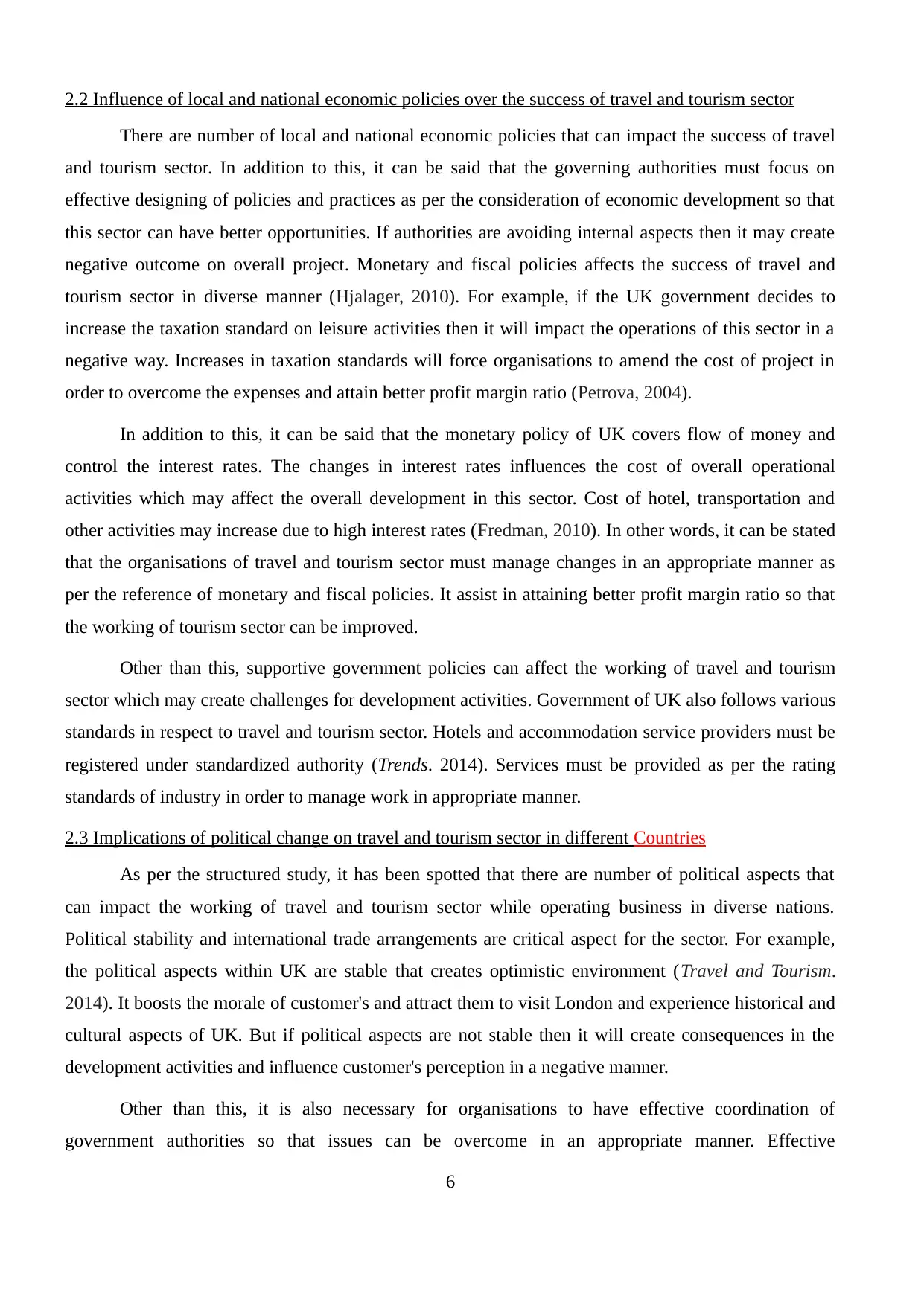
2.2 Influence of local and national economic policies over the success of travel and tourism sector
There are number of local and national economic policies that can impact the success of travel
and tourism sector. In addition to this, it can be said that the governing authorities must focus on
effective designing of policies and practices as per the consideration of economic development so that
this sector can have better opportunities. If authorities are avoiding internal aspects then it may create
negative outcome on overall project. Monetary and fiscal policies affects the success of travel and
tourism sector in diverse manner (Hjalager, 2010). For example, if the UK government decides to
increase the taxation standard on leisure activities then it will impact the operations of this sector in a
negative way. Increases in taxation standards will force organisations to amend the cost of project in
order to overcome the expenses and attain better profit margin ratio (Petrova, 2004).
In addition to this, it can be said that the monetary policy of UK covers flow of money and
control the interest rates. The changes in interest rates influences the cost of overall operational
activities which may affect the overall development in this sector. Cost of hotel, transportation and
other activities may increase due to high interest rates (Fredman, 2010). In other words, it can be stated
that the organisations of travel and tourism sector must manage changes in an appropriate manner as
per the reference of monetary and fiscal policies. It assist in attaining better profit margin ratio so that
the working of tourism sector can be improved.
Other than this, supportive government policies can affect the working of travel and tourism
sector which may create challenges for development activities. Government of UK also follows various
standards in respect to travel and tourism sector. Hotels and accommodation service providers must be
registered under standardized authority (Trends. 2014). Services must be provided as per the rating
standards of industry in order to manage work in appropriate manner.
2.3 Implications of political change on travel and tourism sector in different Countries
As per the structured study, it has been spotted that there are number of political aspects that
can impact the working of travel and tourism sector while operating business in diverse nations.
Political stability and international trade arrangements are critical aspect for the sector. For example,
the political aspects within UK are stable that creates optimistic environment (Travel and Tourism.
2014). It boosts the morale of customer's and attract them to visit London and experience historical and
cultural aspects of UK. But if political aspects are not stable then it will create consequences in the
development activities and influence customer's perception in a negative manner.
Other than this, it is also necessary for organisations to have effective coordination of
government authorities so that issues can be overcome in an appropriate manner. Effective
6
There are number of local and national economic policies that can impact the success of travel
and tourism sector. In addition to this, it can be said that the governing authorities must focus on
effective designing of policies and practices as per the consideration of economic development so that
this sector can have better opportunities. If authorities are avoiding internal aspects then it may create
negative outcome on overall project. Monetary and fiscal policies affects the success of travel and
tourism sector in diverse manner (Hjalager, 2010). For example, if the UK government decides to
increase the taxation standard on leisure activities then it will impact the operations of this sector in a
negative way. Increases in taxation standards will force organisations to amend the cost of project in
order to overcome the expenses and attain better profit margin ratio (Petrova, 2004).
In addition to this, it can be said that the monetary policy of UK covers flow of money and
control the interest rates. The changes in interest rates influences the cost of overall operational
activities which may affect the overall development in this sector. Cost of hotel, transportation and
other activities may increase due to high interest rates (Fredman, 2010). In other words, it can be stated
that the organisations of travel and tourism sector must manage changes in an appropriate manner as
per the reference of monetary and fiscal policies. It assist in attaining better profit margin ratio so that
the working of tourism sector can be improved.
Other than this, supportive government policies can affect the working of travel and tourism
sector which may create challenges for development activities. Government of UK also follows various
standards in respect to travel and tourism sector. Hotels and accommodation service providers must be
registered under standardized authority (Trends. 2014). Services must be provided as per the rating
standards of industry in order to manage work in appropriate manner.
2.3 Implications of political change on travel and tourism sector in different Countries
As per the structured study, it has been spotted that there are number of political aspects that
can impact the working of travel and tourism sector while operating business in diverse nations.
Political stability and international trade arrangements are critical aspect for the sector. For example,
the political aspects within UK are stable that creates optimistic environment (Travel and Tourism.
2014). It boosts the morale of customer's and attract them to visit London and experience historical and
cultural aspects of UK. But if political aspects are not stable then it will create consequences in the
development activities and influence customer's perception in a negative manner.
Other than this, it is also necessary for organisations to have effective coordination of
government authorities so that issues can be overcome in an appropriate manner. Effective
6
⊘ This is a preview!⊘
Do you want full access?
Subscribe today to unlock all pages.

Trusted by 1+ million students worldwide
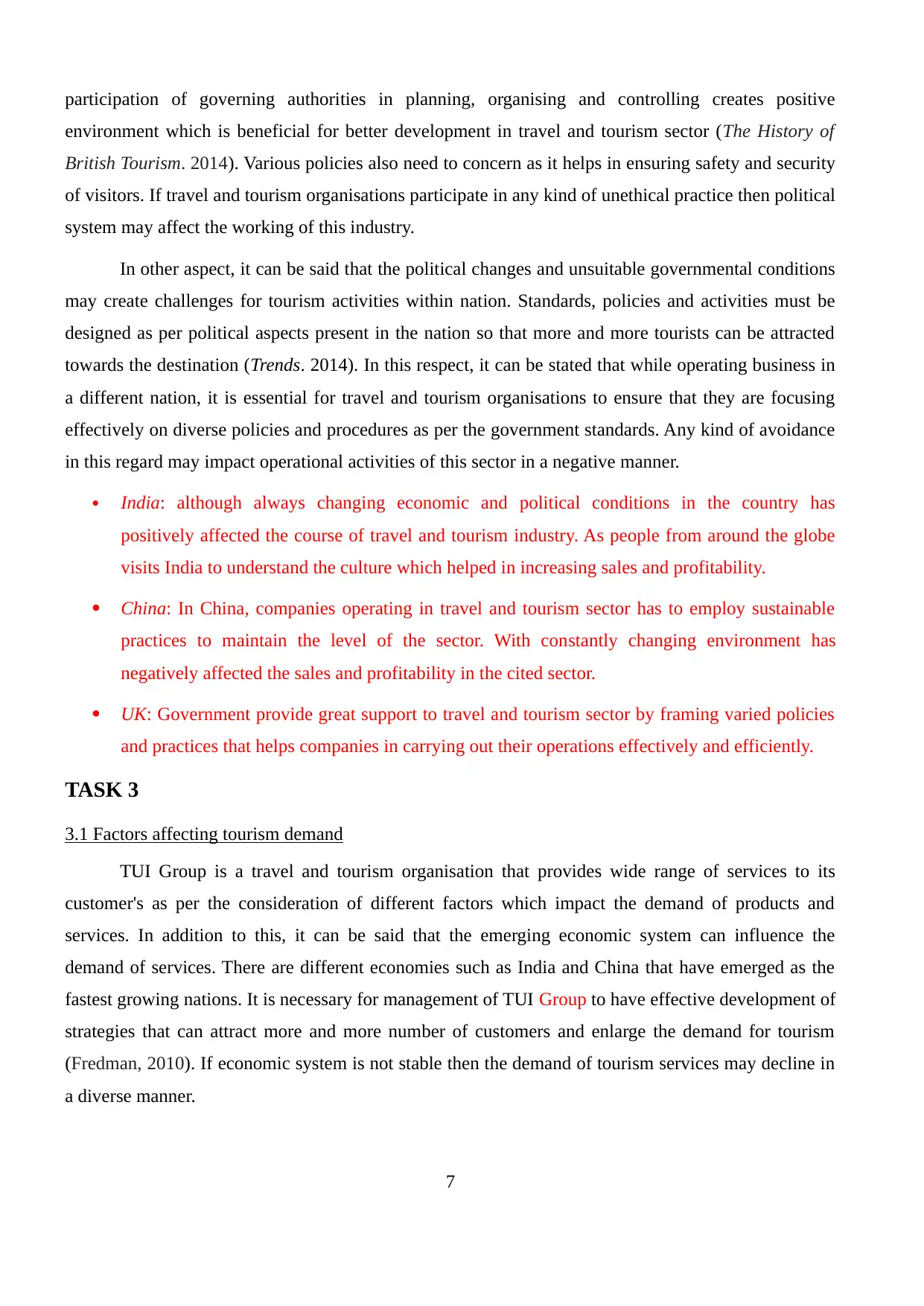
participation of governing authorities in planning, organising and controlling creates positive
environment which is beneficial for better development in travel and tourism sector (The History of
British Tourism. 2014). Various policies also need to concern as it helps in ensuring safety and security
of visitors. If travel and tourism organisations participate in any kind of unethical practice then political
system may affect the working of this industry.
In other aspect, it can be said that the political changes and unsuitable governmental conditions
may create challenges for tourism activities within nation. Standards, policies and activities must be
designed as per political aspects present in the nation so that more and more tourists can be attracted
towards the destination (Trends. 2014). In this respect, it can be stated that while operating business in
a different nation, it is essential for travel and tourism organisations to ensure that they are focusing
effectively on diverse policies and procedures as per the government standards. Any kind of avoidance
in this regard may impact operational activities of this sector in a negative manner.
India: although always changing economic and political conditions in the country has
positively affected the course of travel and tourism industry. As people from around the globe
visits India to understand the culture which helped in increasing sales and profitability.
China: In China, companies operating in travel and tourism sector has to employ sustainable
practices to maintain the level of the sector. With constantly changing environment has
negatively affected the sales and profitability in the cited sector.
UK: Government provide great support to travel and tourism sector by framing varied policies
and practices that helps companies in carrying out their operations effectively and efficiently.
TASK 3
3.1 Factors affecting tourism demand
TUI Group is a travel and tourism organisation that provides wide range of services to its
customer's as per the consideration of different factors which impact the demand of products and
services. In addition to this, it can be said that the emerging economic system can influence the
demand of services. There are different economies such as India and China that have emerged as the
fastest growing nations. It is necessary for management of TUI Group to have effective development of
strategies that can attract more and more number of customers and enlarge the demand for tourism
(Fredman, 2010). If economic system is not stable then the demand of tourism services may decline in
a diverse manner.
7
environment which is beneficial for better development in travel and tourism sector (The History of
British Tourism. 2014). Various policies also need to concern as it helps in ensuring safety and security
of visitors. If travel and tourism organisations participate in any kind of unethical practice then political
system may affect the working of this industry.
In other aspect, it can be said that the political changes and unsuitable governmental conditions
may create challenges for tourism activities within nation. Standards, policies and activities must be
designed as per political aspects present in the nation so that more and more tourists can be attracted
towards the destination (Trends. 2014). In this respect, it can be stated that while operating business in
a different nation, it is essential for travel and tourism organisations to ensure that they are focusing
effectively on diverse policies and procedures as per the government standards. Any kind of avoidance
in this regard may impact operational activities of this sector in a negative manner.
India: although always changing economic and political conditions in the country has
positively affected the course of travel and tourism industry. As people from around the globe
visits India to understand the culture which helped in increasing sales and profitability.
China: In China, companies operating in travel and tourism sector has to employ sustainable
practices to maintain the level of the sector. With constantly changing environment has
negatively affected the sales and profitability in the cited sector.
UK: Government provide great support to travel and tourism sector by framing varied policies
and practices that helps companies in carrying out their operations effectively and efficiently.
TASK 3
3.1 Factors affecting tourism demand
TUI Group is a travel and tourism organisation that provides wide range of services to its
customer's as per the consideration of different factors which impact the demand of products and
services. In addition to this, it can be said that the emerging economic system can influence the
demand of services. There are different economies such as India and China that have emerged as the
fastest growing nations. It is necessary for management of TUI Group to have effective development of
strategies that can attract more and more number of customers and enlarge the demand for tourism
(Fredman, 2010). If economic system is not stable then the demand of tourism services may decline in
a diverse manner.
7
Paraphrase This Document
Need a fresh take? Get an instant paraphrase of this document with our AI Paraphraser

In addition to this, demographic factors can also influence the demand of tourism services. It
covers various factors that are related to social aspects such as lifestyle, age, income level of
individual. For instance, the UK citizens are now more attracted towards low cost services due to low
income level. It will force management of TUI Group to cut down the cost of operational activities and
tour package so that firm can easily meet the needs of customers in an appropriate manner (Petrova,
2004). In addition to this, it can also be said that the young age people are more attracted towards
adventure tourism activities, it means it is essential for management to design a new tour package as
per the needs of youngsters in order to attain sustainability. If company will not make changes in
services as per needs then demand of services will decrease.
Other than this, political and social factors can also impact the demand of tourism services.
Social factors involves choice and preference of people that influences their needs regarding travel and
tour. Improper design of services and tour packages will impact the demand of services in a negative
manner (Hjalager, 2010). Changes in government policies that are related with working of travel and
tourism sector may also impact business in negative manner.
3.2 Supply has changed to meet the effects of demand
As per current market conditions, the supply of services has changed in order to meet the
demand aspect. It is essential for management of TUI Group to design effective delivery system in
order to fulfil the demand. In addition to this, seasonality is one of the significant factor that may
impact demand of services. In seasonal circumstances, the organisation increases the cost of services
which impacts the demand criteria and helps business firm in managing it (Boniface, 2012). Number of
policies also need to develop to manage activities during peak season. It is essential for the TUI Group
to consider the interest and lifestyle of people and then provide them required transportation such as
air, rail, cruise and road. In order to meet the demand, the organisation focuses on diverse means of
transportation and provide services to customers as per their preferences (Sisay, 2009).
Moreover, buses and cabs also being arranged by tour operators so that demands can be
satisfied. Other key factor is accommodation so, in order to manage accommodation services the
organisation offers wide range of accommodation services as per their needs and income level. It helps
in classify customers as per their different demand which is beneficial to balance supply and demand.
TASK 4
4.1 Positive and negative economic, environmental and social impacts of tourism
It has been determined that there are number of positive and negative outcome of tourism on
economic, environmental and social aspects. Classification of outcomes can be as:
8
covers various factors that are related to social aspects such as lifestyle, age, income level of
individual. For instance, the UK citizens are now more attracted towards low cost services due to low
income level. It will force management of TUI Group to cut down the cost of operational activities and
tour package so that firm can easily meet the needs of customers in an appropriate manner (Petrova,
2004). In addition to this, it can also be said that the young age people are more attracted towards
adventure tourism activities, it means it is essential for management to design a new tour package as
per the needs of youngsters in order to attain sustainability. If company will not make changes in
services as per needs then demand of services will decrease.
Other than this, political and social factors can also impact the demand of tourism services.
Social factors involves choice and preference of people that influences their needs regarding travel and
tour. Improper design of services and tour packages will impact the demand of services in a negative
manner (Hjalager, 2010). Changes in government policies that are related with working of travel and
tourism sector may also impact business in negative manner.
3.2 Supply has changed to meet the effects of demand
As per current market conditions, the supply of services has changed in order to meet the
demand aspect. It is essential for management of TUI Group to design effective delivery system in
order to fulfil the demand. In addition to this, seasonality is one of the significant factor that may
impact demand of services. In seasonal circumstances, the organisation increases the cost of services
which impacts the demand criteria and helps business firm in managing it (Boniface, 2012). Number of
policies also need to develop to manage activities during peak season. It is essential for the TUI Group
to consider the interest and lifestyle of people and then provide them required transportation such as
air, rail, cruise and road. In order to meet the demand, the organisation focuses on diverse means of
transportation and provide services to customers as per their preferences (Sisay, 2009).
Moreover, buses and cabs also being arranged by tour operators so that demands can be
satisfied. Other key factor is accommodation so, in order to manage accommodation services the
organisation offers wide range of accommodation services as per their needs and income level. It helps
in classify customers as per their different demand which is beneficial to balance supply and demand.
TASK 4
4.1 Positive and negative economic, environmental and social impacts of tourism
It has been determined that there are number of positive and negative outcome of tourism on
economic, environmental and social aspects. Classification of outcomes can be as:
8

Elements Positive Outcome Negative Outcome
Economic In current market scenario the demand of
travel and tourism services is increased. It
attracts more and more customers towards
business. Advanced level of customers
increases the profit margin of this sector. It
also raises the economic growth within the
nation. It also increases the job
opportunities for local citizens and
motivate several investors to expand
business in the international market
(Marvell, 2006). It also creates a strong
image of nation within foreign market
conditions.
Globalization and international
tourism provides various
benefits by playing a
significant role in foreign
investment and generate better
revenue. But it may also
influence the economic system
in a negative manner. Such as
it may increase the outflow of
currency which impacts the
economic system in negative
manner (Zhang, 2009).
Foreign reserve can also get
impacted in a diverse manner.
Environmental It provides effective focus on natural
resources such as wildlife, water etc. It
also allows diverse travellers to visit nation
and experience the wildlife areas. It also
provides opportunity to understand the
different breed of birds and animals. It is
significant for local authorities to set out
diverse standards. Along with this,
providing safeguarding to environmental
aspects is beneficial (Ruhanen, 2012).
Proper water management can boost the
positive outcome within environment.
Environmental factors also
have negative impact on the
travel and tourism sector as
number of travellers influences
the environmental aspects.
Various illegal activities like
wild animals hunting ratio also
increases which influences the
ecological balance within
nation.
Social It provides better opportunity to social
developments. It also attracts people to
travel in domestic and international areas.
Number of adventurous activities can also
It also has various negative
impacts on the social aspects.
For instance, the regular
interaction of local community
9
Economic In current market scenario the demand of
travel and tourism services is increased. It
attracts more and more customers towards
business. Advanced level of customers
increases the profit margin of this sector. It
also raises the economic growth within the
nation. It also increases the job
opportunities for local citizens and
motivate several investors to expand
business in the international market
(Marvell, 2006). It also creates a strong
image of nation within foreign market
conditions.
Globalization and international
tourism provides various
benefits by playing a
significant role in foreign
investment and generate better
revenue. But it may also
influence the economic system
in a negative manner. Such as
it may increase the outflow of
currency which impacts the
economic system in negative
manner (Zhang, 2009).
Foreign reserve can also get
impacted in a diverse manner.
Environmental It provides effective focus on natural
resources such as wildlife, water etc. It
also allows diverse travellers to visit nation
and experience the wildlife areas. It also
provides opportunity to understand the
different breed of birds and animals. It is
significant for local authorities to set out
diverse standards. Along with this,
providing safeguarding to environmental
aspects is beneficial (Ruhanen, 2012).
Proper water management can boost the
positive outcome within environment.
Environmental factors also
have negative impact on the
travel and tourism sector as
number of travellers influences
the environmental aspects.
Various illegal activities like
wild animals hunting ratio also
increases which influences the
ecological balance within
nation.
Social It provides better opportunity to social
developments. It also attracts people to
travel in domestic and international areas.
Number of adventurous activities can also
It also has various negative
impacts on the social aspects.
For instance, the regular
interaction of local community
9
⊘ This is a preview!⊘
Do you want full access?
Subscribe today to unlock all pages.

Trusted by 1+ million students worldwide
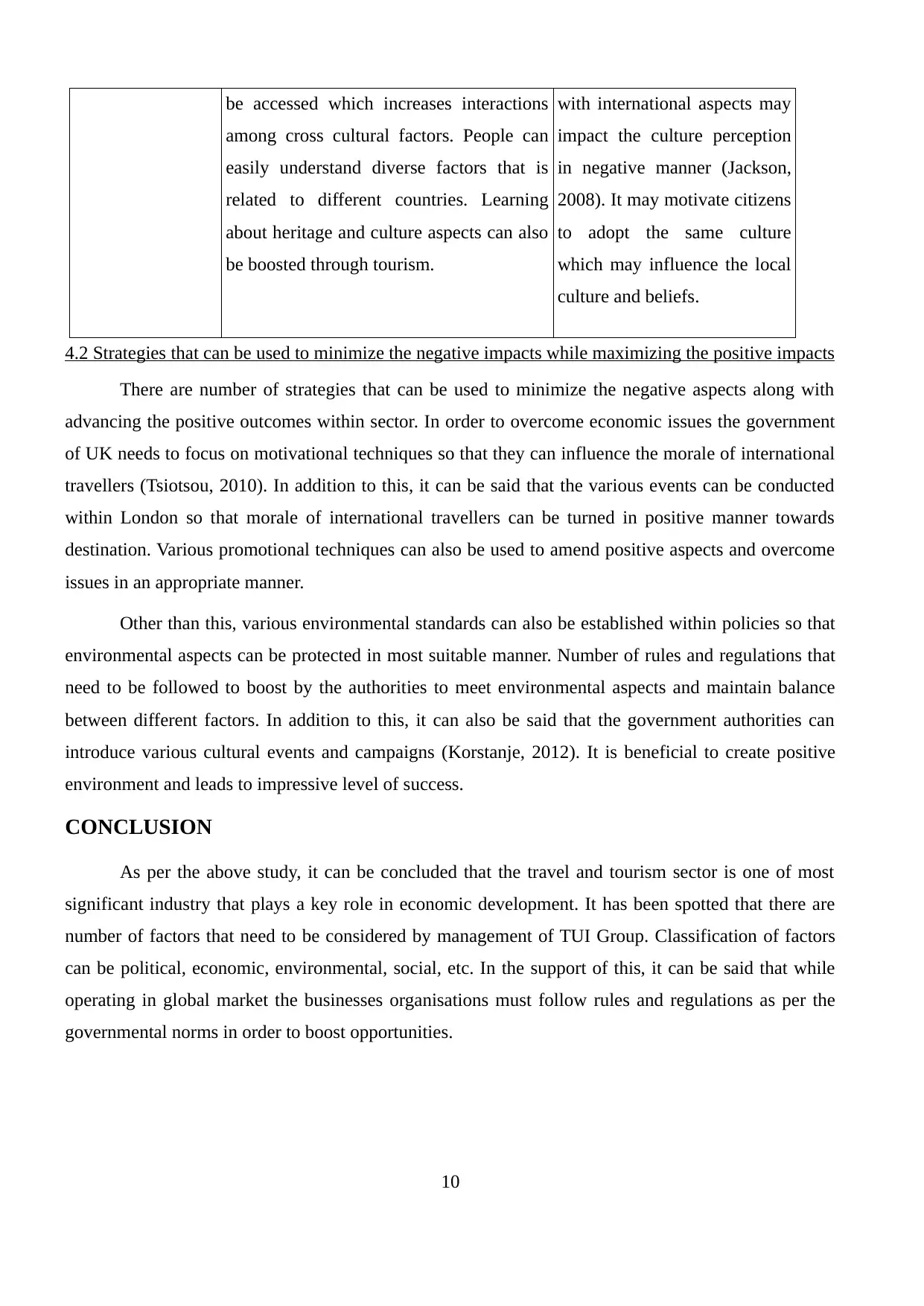
be accessed which increases interactions
among cross cultural factors. People can
easily understand diverse factors that is
related to different countries. Learning
about heritage and culture aspects can also
be boosted through tourism.
with international aspects may
impact the culture perception
in negative manner (Jackson,
2008). It may motivate citizens
to adopt the same culture
which may influence the local
culture and beliefs.
4.2 Strategies that can be used to minimize the negative impacts while maximizing the positive impacts
There are number of strategies that can be used to minimize the negative aspects along with
advancing the positive outcomes within sector. In order to overcome economic issues the government
of UK needs to focus on motivational techniques so that they can influence the morale of international
travellers (Tsiotsou, 2010). In addition to this, it can be said that the various events can be conducted
within London so that morale of international travellers can be turned in positive manner towards
destination. Various promotional techniques can also be used to amend positive aspects and overcome
issues in an appropriate manner.
Other than this, various environmental standards can also be established within policies so that
environmental aspects can be protected in most suitable manner. Number of rules and regulations that
need to be followed to boost by the authorities to meet environmental aspects and maintain balance
between different factors. In addition to this, it can also be said that the government authorities can
introduce various cultural events and campaigns (Korstanje, 2012). It is beneficial to create positive
environment and leads to impressive level of success.
CONCLUSION
As per the above study, it can be concluded that the travel and tourism sector is one of most
significant industry that plays a key role in economic development. It has been spotted that there are
number of factors that need to be considered by management of TUI Group. Classification of factors
can be political, economic, environmental, social, etc. In the support of this, it can be said that while
operating in global market the businesses organisations must follow rules and regulations as per the
governmental norms in order to boost opportunities.
10
among cross cultural factors. People can
easily understand diverse factors that is
related to different countries. Learning
about heritage and culture aspects can also
be boosted through tourism.
with international aspects may
impact the culture perception
in negative manner (Jackson,
2008). It may motivate citizens
to adopt the same culture
which may influence the local
culture and beliefs.
4.2 Strategies that can be used to minimize the negative impacts while maximizing the positive impacts
There are number of strategies that can be used to minimize the negative aspects along with
advancing the positive outcomes within sector. In order to overcome economic issues the government
of UK needs to focus on motivational techniques so that they can influence the morale of international
travellers (Tsiotsou, 2010). In addition to this, it can be said that the various events can be conducted
within London so that morale of international travellers can be turned in positive manner towards
destination. Various promotional techniques can also be used to amend positive aspects and overcome
issues in an appropriate manner.
Other than this, various environmental standards can also be established within policies so that
environmental aspects can be protected in most suitable manner. Number of rules and regulations that
need to be followed to boost by the authorities to meet environmental aspects and maintain balance
between different factors. In addition to this, it can also be said that the government authorities can
introduce various cultural events and campaigns (Korstanje, 2012). It is beneficial to create positive
environment and leads to impressive level of success.
CONCLUSION
As per the above study, it can be concluded that the travel and tourism sector is one of most
significant industry that plays a key role in economic development. It has been spotted that there are
number of factors that need to be considered by management of TUI Group. Classification of factors
can be political, economic, environmental, social, etc. In the support of this, it can be said that while
operating in global market the businesses organisations must follow rules and regulations as per the
governmental norms in order to boost opportunities.
10
Paraphrase This Document
Need a fresh take? Get an instant paraphrase of this document with our AI Paraphraser
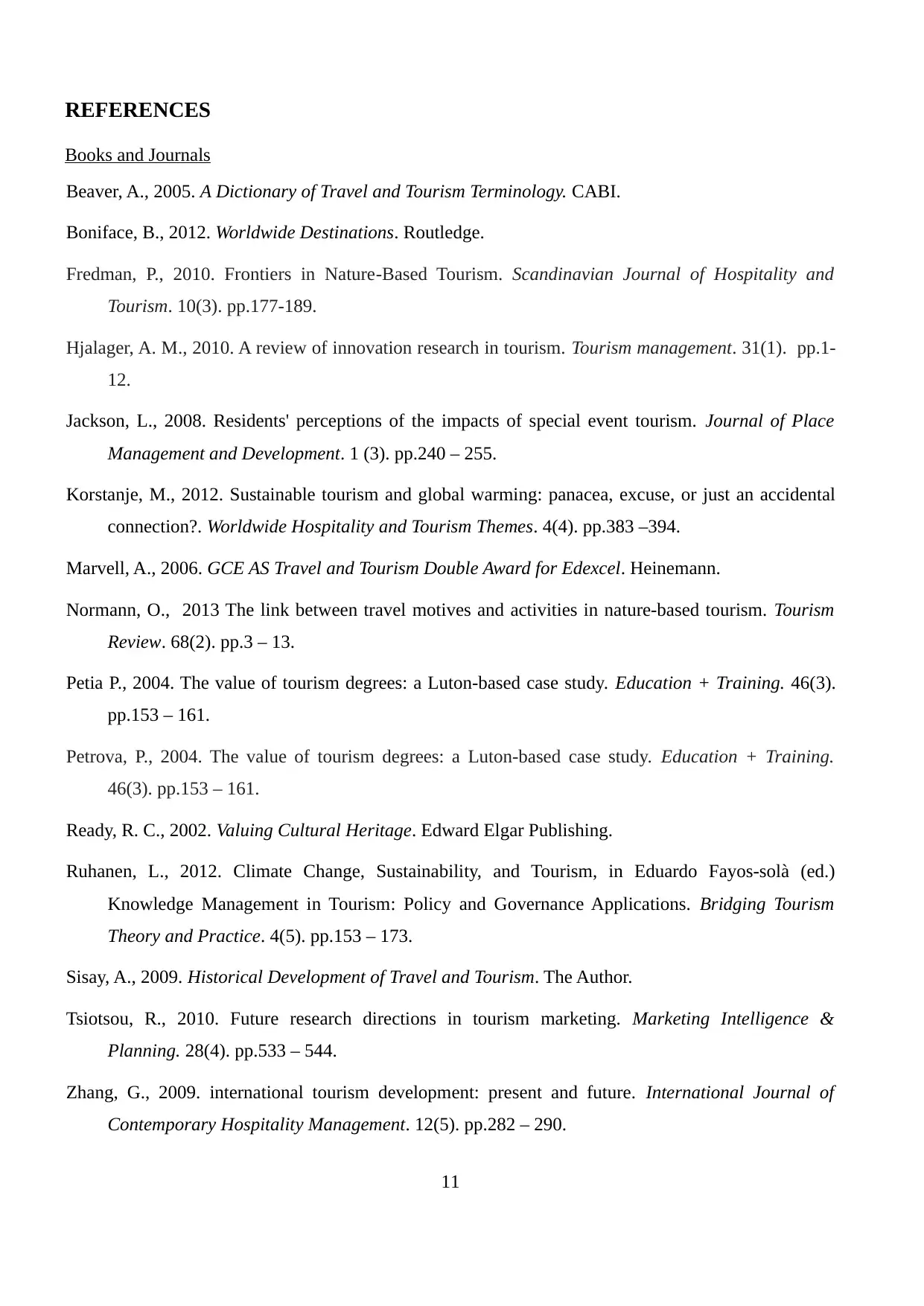
REFERENCES
Books and Journals
Beaver, A., 2005. A Dictionary of Travel and Tourism Terminology. CABI.
Boniface, B., 2012. Worldwide Destinations. Routledge.
Fredman, P., 2010. Frontiers in Nature‐Based Tourism. Scandinavian Journal of Hospitality and
Tourism. 10(3). pp.177-189.
Hjalager, A. M., 2010. A review of innovation research in tourism. Tourism management. 31(1). pp.1-
12.
Jackson, L., 2008. Residents' perceptions of the impacts of special event tourism. Journal of Place
Management and Development. 1 (3). pp.240 – 255.
Korstanje, M., 2012. Sustainable tourism and global warming: panacea, excuse, or just an accidental
connection?. Worldwide Hospitality and Tourism Themes. 4(4). pp.383 –394.
Marvell, A., 2006. GCE AS Travel and Tourism Double Award for Edexcel. Heinemann.
Normann, O., 2013 The link between travel motives and activities in nature-based tourism. Tourism
Review. 68(2). pp.3 – 13.
Petia P., 2004. The value of tourism degrees: a Luton-based case study. Education + Training. 46(3).
pp.153 – 161.
Petrova, P., 2004. The value of tourism degrees: a Luton-based case study. Education + Training.
46(3). pp.153 – 161.
Ready, R. C., 2002. Valuing Cultural Heritage. Edward Elgar Publishing.
Ruhanen, L., 2012. Climate Change, Sustainability, and Tourism, in Eduardo Fayos-solà (ed.)
Knowledge Management in Tourism: Policy and Governance Applications. Bridging Tourism
Theory and Practice. 4(5). pp.153 – 173.
Sisay, A., 2009. Historical Development of Travel and Tourism. The Author.
Tsiotsou, R., 2010. Future research directions in tourism marketing. Marketing Intelligence &
Planning. 28(4). pp.533 – 544.
Zhang, G., 2009. international tourism development: present and future. International Journal of
Contemporary Hospitality Management. 12(5). pp.282 – 290.
11
Books and Journals
Beaver, A., 2005. A Dictionary of Travel and Tourism Terminology. CABI.
Boniface, B., 2012. Worldwide Destinations. Routledge.
Fredman, P., 2010. Frontiers in Nature‐Based Tourism. Scandinavian Journal of Hospitality and
Tourism. 10(3). pp.177-189.
Hjalager, A. M., 2010. A review of innovation research in tourism. Tourism management. 31(1). pp.1-
12.
Jackson, L., 2008. Residents' perceptions of the impacts of special event tourism. Journal of Place
Management and Development. 1 (3). pp.240 – 255.
Korstanje, M., 2012. Sustainable tourism and global warming: panacea, excuse, or just an accidental
connection?. Worldwide Hospitality and Tourism Themes. 4(4). pp.383 –394.
Marvell, A., 2006. GCE AS Travel and Tourism Double Award for Edexcel. Heinemann.
Normann, O., 2013 The link between travel motives and activities in nature-based tourism. Tourism
Review. 68(2). pp.3 – 13.
Petia P., 2004. The value of tourism degrees: a Luton-based case study. Education + Training. 46(3).
pp.153 – 161.
Petrova, P., 2004. The value of tourism degrees: a Luton-based case study. Education + Training.
46(3). pp.153 – 161.
Ready, R. C., 2002. Valuing Cultural Heritage. Edward Elgar Publishing.
Ruhanen, L., 2012. Climate Change, Sustainability, and Tourism, in Eduardo Fayos-solà (ed.)
Knowledge Management in Tourism: Policy and Governance Applications. Bridging Tourism
Theory and Practice. 4(5). pp.153 – 173.
Sisay, A., 2009. Historical Development of Travel and Tourism. The Author.
Tsiotsou, R., 2010. Future research directions in tourism marketing. Marketing Intelligence &
Planning. 28(4). pp.533 – 544.
Zhang, G., 2009. international tourism development: present and future. International Journal of
Contemporary Hospitality Management. 12(5). pp.282 – 290.
11
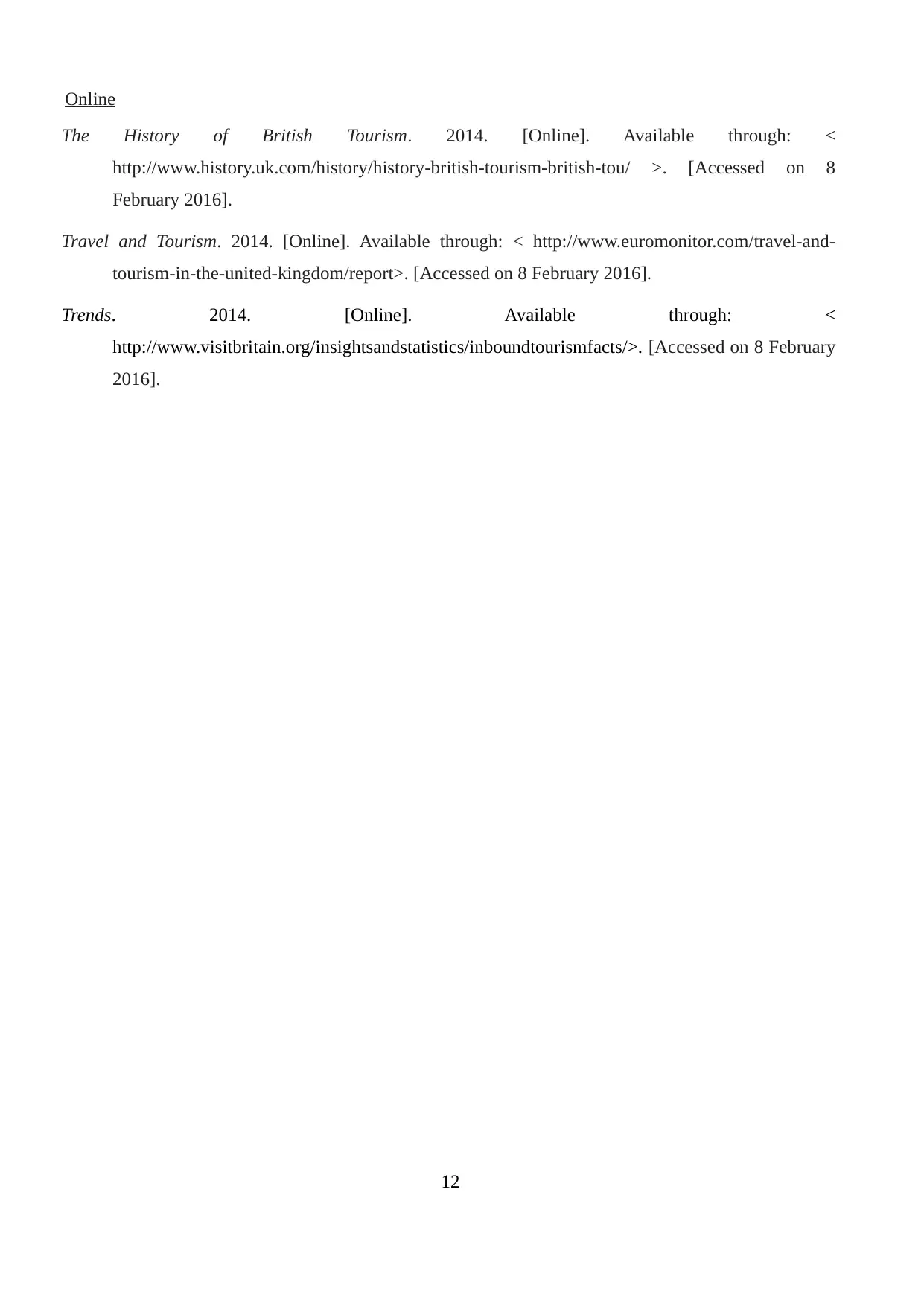
Online
The History of British Tourism. 2014. [Online]. Available through: <
http://www.history.uk.com/history/history-british-tourism-british-tou/ >. [Accessed on 8
February 2016].
Travel and Tourism. 2014. [Online]. Available through: < http://www.euromonitor.com/travel-and-
tourism-in-the-united-kingdom/report>. [Accessed on 8 February 2016].
Trends. 2014. [Online]. Available through: <
http://www.visitbritain.org/insightsandstatistics/inboundtourismfacts/>. [Accessed on 8 February
2016].
12
The History of British Tourism. 2014. [Online]. Available through: <
http://www.history.uk.com/history/history-british-tourism-british-tou/ >. [Accessed on 8
February 2016].
Travel and Tourism. 2014. [Online]. Available through: < http://www.euromonitor.com/travel-and-
tourism-in-the-united-kingdom/report>. [Accessed on 8 February 2016].
Trends. 2014. [Online]. Available through: <
http://www.visitbritain.org/insightsandstatistics/inboundtourismfacts/>. [Accessed on 8 February
2016].
12
⊘ This is a preview!⊘
Do you want full access?
Subscribe today to unlock all pages.

Trusted by 1+ million students worldwide
1 out of 13
Related Documents
Your All-in-One AI-Powered Toolkit for Academic Success.
+13062052269
info@desklib.com
Available 24*7 on WhatsApp / Email
![[object Object]](/_next/static/media/star-bottom.7253800d.svg)
Unlock your academic potential
Copyright © 2020–2026 A2Z Services. All Rights Reserved. Developed and managed by ZUCOL.





